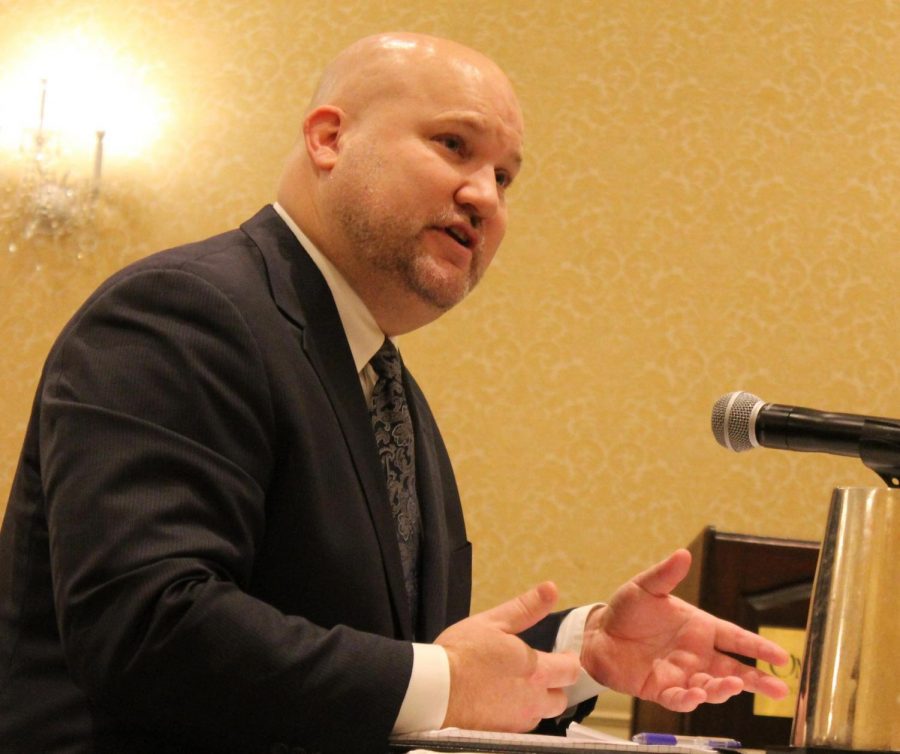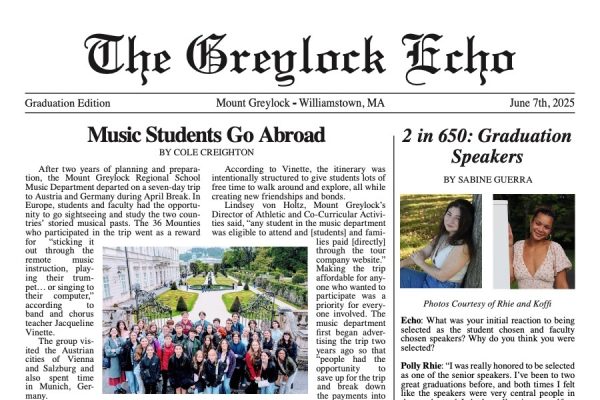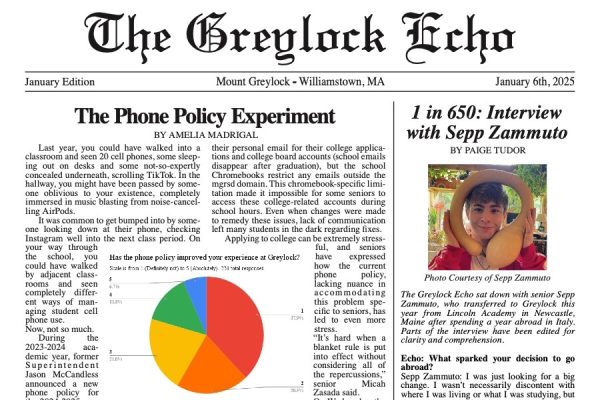Students, Teachers Protest MCAS Question
Photo courtesy of New England Public Radio
Jeffrey Riley, commissioner of DESE, speaks at a talk last year.
During the English Language Arts MCAS (Massachusetts Comprehensive Assessment System) exam this spring, sophomores encountered a narrative essay prompt based on a passage from the novel The Underground Railroad by Colson Whitehead, and students were asked to write a journal entry from the perspective of an openly racist character, Ethel. Much controversy was sparked as some students and teachers felt that in order to properly portray the character and to receive maximum points, they, too, had to include derogatory language in their response. The Department of Elementary and Secondary Education (DESE) has announced that the question will not be scored.
Mount Greylock English teacher Matthew Fisher perceived a high degree of anger among students following the test. “Once the scandal broke, everyone thought it was racist and didn’t like it,” he said.
“I didn’t want to say something racist on the MCAS, but I was like, ‘are you supposed to write racist stuff down on your MCAS?’” sophomore Izzy Leonard said of the assignment.
Many students explained the experience as inappropriate and even traumatic. Although the prompt was to write from another character’s point of view, the point of view of Ethel greatly differed from some students’ personal opinions and values, meaning that not only were students dealing with the stress of the standardized test, but they also had to deal with conflicting ethics. Therefore, some students expressed felt that they could not perform to their best writing abilities.
Students also feared that writing the prompt in a less racially derogatory fashion than the passage was presented would end up losing them points. “I didn’t feel like I needed to [use racial slurs] but at the same time, I was kind of making up a whole new character,” explained Leonard.
Some students took the prompt in a different way. Instead of writing the journal entry from the point of view of a racist and dealing with the conflicts of whether or not to use derogatory language, some wrote the entry from the perspective of a cold woman instead.
“I didn’t take it as racist, but I can see how some people would think it was,” said sophomore Abby Rudin. Several other students also said that they decided to answer the prompt depicting Ethel as a cold character instead of particularly racist.
The prompt caused much controversy in the first place because students felt that they had to use derogatory language and they did not feel comfortable in doing so. However, lots of students did not feel that they necessarily had to use racial slurs to depict Ethel. Instead, it was more the idea of almost rationalizing racism that struck these students as inappropriate and unnecessary.
Last Sunday, the Commissioner of DESE, Jeffrey Riley, decided to remove the question from the scoring of the test.
“On Sunday, March 31, I decided that we would not score the item, and we asked districts to instruct students who were taking makeup tests not to answer the question,” wrote Riley in a weekly update on Friday.
The question remains: was it right for the state to completely toss the question? Students spent lots of time writing the narrative, but it might not have been an accurate measurement of students’ writing ability due to the possible sensitivity of the prompt, according to some.
“What the state is doing is looking at the error and penalizing students for its own mistake,” Fisher explained. Fisher also mentioned the fine margin between pass and fail, which in the context of MCAS means being able to graduate and having to try again. “Had they counted the essay, some students who failed might’ve passed. If I were them, I would discount the test and pass everyone. Students shouldn’t have to pay the price for the state’s mistake.”
Riley noted that “The test will still have a similar ratio of writing to other content as in past years, even with this essay question removed.”
Some students felt that not scoring and discarding the question was the proper response.
“It was an inappropriate question; most kids probably didn’t know how to do it and didn’t answer what the prompt wanted. It should be ignored,” said Leonard.
DESE claims that students will not have to retake because only that one question will not be scored. However, many bodies, including the Massachusetts Teachers’ Association, the Boston Teachers’ Union, the American Federation of Teachers Massachusetts, the Massachusetts Education Justice Alliance, and the New England Area Conference of the NAACP, have called for the entire test to be invalidated.
“Students of color reported being traumatized that they and other students were being required to reflect those noxious views,” reported the Massachusetts Teachers’ Association on their website this week. “To make matters worse, students and educators are forbidden by DESE from talking about the questions or the impact they’ve had on students.”
The MTA called for DESE to “cancel the entire 10th-grade exam and hold all students harmless” and to “implement a moratorium on MCAS because of the harm it is doing to our students.”
“We have a strong item review process, but this question got through. We take responsibility for it and will learn from this,” said Riley in his update. “We are continuing to review all the information related to this issue to determine how we can improve the process in the future.”








